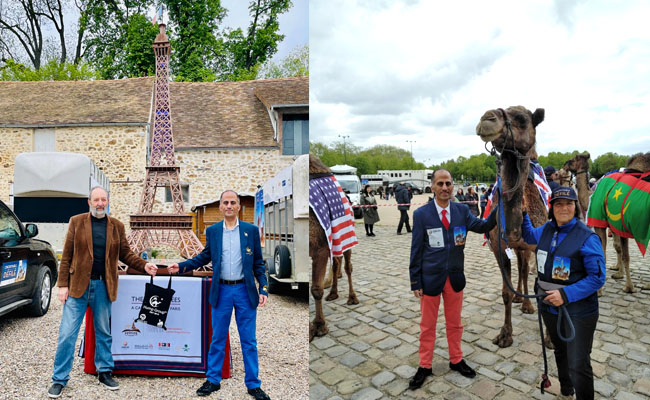PARIS, FRANCE: The United Kingdom took part in a special Camel parade which took place in Paris, France on Saturday 20th April, in celebration of the UN’s designation of 2024 as the International Year of Camelids.
The event in Paris was organised by the French Federation for the Development of Camelids in France and Europe (FFDCFE), under the umbrella of the International Camel Organisation, and was sponsored by the Saudi Ministry of Culture and the Saudi Camel Club. Participants in the parade of the Camelids family (camels, llamas and alpacas) included more than 50 representatives from more than 30 countries, along with camel breeders, government officials, others with a passion in the animals and performers and of folklore traditions.
Birmingham based Hump Group who has been raising the awareness of the Bedouin culture and importance of camels since 2015 was representing the United Kingdom.
Delegates from around the world attended this historic parade. (© FFDCFE)
A man known as Birmingham’s camel Sheikh said on behalf of Hump Group, “Being here at this historic parade is a symbol of unity and peace. We join Cameleers from across the globe to celebrate the UN International Year of Camelids 2024 but also to highlight the historic and future importance of camels. Camels have supported societies in cross-continental caravans, building infrastructure, transporting people and goods, connecting different cultures and providing milk, meat, wool and draught since they were domesticated several thousands of years ago. We must not forget the value of camels and nor disregard the importance of heritage and culture.”
In addition to the UK, the countries that were represented included the US, Qatar, Oman, Canada, India, Morocco, Peru, Algeria, France, Czech Republic, Spain, the Democratic Republic of the Congo, Mauritania, Tunisia, Chad, Uganda, Pakistan and Uganda.
The United Nations Food and Agriculture Organisation named 2024 as the International Year of Camelids to honour and promote the sector and highlight the important role it plays in efforts to achieve food security and economic growth in many countries.
